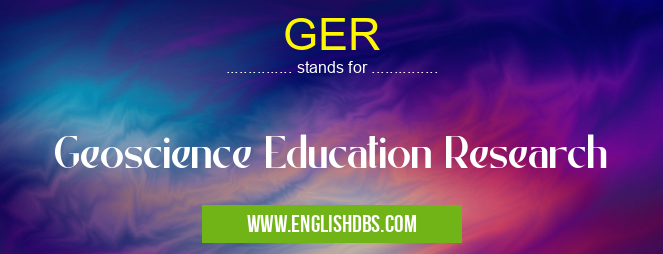What does GER mean in RESEARCH
Geoscience Education Research (GER) is a field of study that focuses on the teaching and learning of geosciences. It is a relatively new field, with most of the research being conducted in the past 20 years. GER is important because it can help us to understand how students learn about geosciences, and how we can improve their learning.

GER meaning in Research in Academic & Science
GER mostly used in an acronym Research in Category Academic & Science that means Geoscience Education Research
Shorthand: GER,
Full Form: Geoscience Education Research
For more information of "Geoscience Education Research", see the section below.
What is GER?
GER is the study of how people learn about the Earth sciences. It includes research on how students learn about geology, meteorology, oceanography, and other geoscience disciplines. GER also includes research on how teachers teach geosciences, and how to develop effective geoscience curricula.
Why is GER important?
GER is important because it can help us to improve the teaching and learning of geosciences. By understanding how students learn, we can develop more effective teaching methods and materials. GER can also help us to identify the challenges that students face in learning about geosciences, and to develop strategies to overcome those challenges.
What are the goals of GER?
The goals of GER are to:
- Understand how students learn about geosciences
- Develop more effective teaching methods and materials
- Identify the challenges that students face in learning about geosciences
- Develop strategies to overcome those challenges
Essential Questions and Answers on Geoscience Education Research in "SCIENCE»RESEARCH"
What is Geoscience Education Research (GER)?
Geoscience Education Research (GER) explores the teaching and learning of Earth and space sciences. It aims to improve geoscience education practices and enhance student understanding of Earth's systems and processes.
Why is GER important?
GER is crucial because it helps educators develop effective teaching strategies, create engaging learning environments, and assess student understanding. By understanding how students learn best, GER can help improve the quality of geoscience education worldwide.
What are some key research areas in GER?
Key research areas in GER include:
- Student learning and understanding of geoscience concepts
- Effective teaching practices and curriculum design
- Assessment and evaluation of student learning
- Diversity and inclusion in geoscience education
- Technology integration in geoscience classrooms
How can I get involved in GER?
There are several ways to get involved in GER:
- Attend conferences and workshops
- Join professional organizations like the National Association of Geoscience Teachers (NAGT)
- Conduct research or collaborate with researchers
- Share your teaching experiences and resources
- Mentor students interested in GER
What are some resources for GER?
Numerous resources are available for GER, including:
- NAGT's Center for Geoscience Education Research (CGER)
- The Journal of Geoscience Education
- The International Geoscience Education Organization (IGEO)
- The American Geophysical Union's Education Section
- Online communities and social media groups
Final Words: GER is a growing field of study that has the potential to make a significant contribution to the teaching and learning of geosciences. By understanding how students learn, we can develop more effective teaching methods and materials, and help students to achieve their full potential in geosciences.
